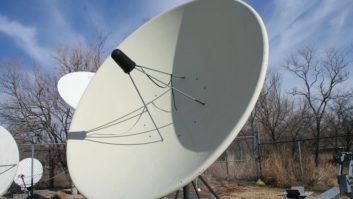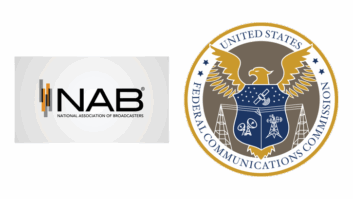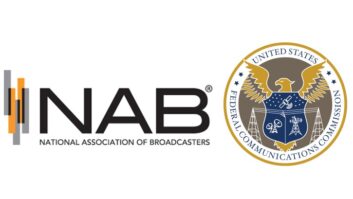The geotargeting debate was already getting contentious. On Friday it took a new turn. The National Association of Broadcasters is augmenting its argument against the implementation of FM geo-targeting with new assertions about the founder and CEO of GeoBroadcast Solutions, Chris Devine.
In a new ex parte filing with the FCC, the association raises what it calls “serious concerns with the GBS proposal’s merits in the context of credible and public accusations regarding questionable business dealings” of Devine.
GBS responded to the criticism calling it “NAB’s tabloid filing” and “a desperate attempt at character assassination.”
The filing
“NAB believes that Mr. Devine’s track record requires the commission to examine the underlying information carefully and reject his petition,” the association wrote to the FCC.
GBS has been lobbying the FCC for a rule change to allow for its FM booster technology, which is marketed under the name ZoneCasting, to be implemented by broadcasters, allowing them to voluntarily geo-target some of their broadcast content for short periods of time.
Radio World has reported extensively on the GBS rulemaking proposal.
Up until now, NAB has argued that the geo-targeting technology would “inevitably damage radio technical integrity and serve as a lever for advertisers to force radio broadcasters to reduce their advertising rates,” but the new filing brings a shift in NAB’s focus.
NAB details a wide array of what it calls “publicly available information detailing some of the instances where Devine has been credibly accused of fraudulent and deceitful conduct.”
For instance: “In 2009, Mr. Devine was sued by Robert Allen, III, who alleged that Mr. Devine had defrauded Mr. Allen of roughly $70 million. According to Mr. Allen’s family, Mr. Devine befriended Mr. Allen, who over time became elderly and infirm, and convinced Mr. Allen to invest tens of millions of dollars in Superior Broadcasting Company, Inc. (Superior), a company ostensibly created to buy and operate radio stations.
“According to the lawsuit, unbeknownst to Mr. Allen, and despite his $70 million investment in Superior, Mr. Devine did not purchase a single station for the company. Instead, over the course of years, Mr. Devine and his accomplices allegedly siphoned millions of dollars directly to themselves and to fund investments with no benefit to Mr. Allen. As part of this scheme, Mr. Devine allegedly falsified financial statements to deceive Mr. Allen,” NAB commented.
NAB goes on to detail other instances of what it calls questionable behavior by Devine, including his former ownership of Devine Racing, a company that specialized in marathon races.
“Again, Mr. Devine was accused of downright immoral business practices, and leaving a wide boulevard of broken promises everywhere [Devine Racing] operated,” NAB asserts. “During this period, Mr. Devine and his various companies were the subject of numerous lawsuits, as well as multiple IRS liens worth over $1.1 million.”
The broadcaster advocacy group also noted that the FCC previously found Devine to be untruthful in at least one instance.
NAB says in 1993 the commission investigated Devine for allegedly engaging in a sham assignment of a radio station license to circumvent the commission’s ownership rules. “The Mass Media Bureau considered the information provided by Mr. Devine, regarding the transfer of a station in Spanish Fork, Utah, to an employee (who quit soon thereafter), and concluded that Devine and [the employee] have provided false information to the commission.
“This false information includes the representation that Devine divested control of the Spanish Fork station and the representation that [the employee] assumed control of the station when Devine and/or [his business partner] are actually in de facto control. The full commission agreed, finding that Mr. Devine’s responses to commission inquiries concerning this assignment appear to have been false or deceptive,” according to NAB.
In addition, NAB alleges GBS has attempted to falsify an intra-radio industry rift regarding its geo-targeting proposal.
“Mr. Devine’s company contends there is a thinly veiled goal of the largest radio group owners reinforcing and seeking to maintain their dominant position in the market by denying smaller broadcasters an opportunity to use technology to level the playing field,” NAB commented to the FCC. “NAB, which vigorously represents broadcasters of all sizes, could not disagree more.”
NAB continued: “To NAB’s knowledge, nearly every broadcaster that has seriously considered the implications of the rule change at issue has vehemently opposed it.”
Specifically, NAB contends “the vast majority of comments from broadcasters supporting GBS’ proposal are form letters, and that these form letters − representing what NAB believes to be 93 of the 109 stations purportedly supporting GBS − were signed by a longtime counsel to GBS, who has also been a Devine business partner.”
NAB concluded the ex parte by urging the FCC to “not become the latest in a long line of those who regret having trusted Mr. Devine and his businesses’ representations” and to reject the GBS geo-targeting proposal.
GBS reply
Radio World invited GBS to respond to NAB’s claims.
“In a desperate attempt at character assassination,” the company wrote in an emailed statement, “the NAB’s tabloid filing omits one critical but publicly known fact: the lawsuit that gave rise to all of these allegations that the NAB launders before the FCC was voluntarily dismissed by the plaintiff with prejudice. Frivolous lawsuits and accusations happen in business, and the NAB’s members know this.
“Knowing its technical arguments are going nowhere, NAB has resorted to character assassination to shield the largest radio stations from competition by minority-owned and small broadcasters. The question before the FCC is whether the technology can be deployed consistent with the FCC’s rules and the record overwhelmingly shows it does.”
[Related: “Time for Auto Makers to Rescue Radio“]
[Related: “Beware of the Empty Promises of ZoneCasting“]







